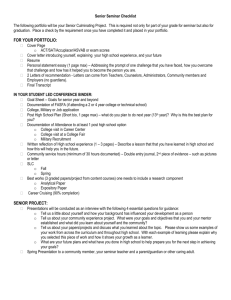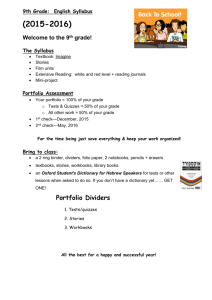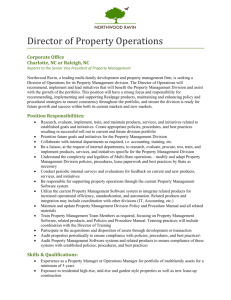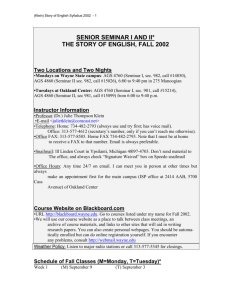Freshman Honors Seminar Draft Syllabus, David Ellis Course
advertisement
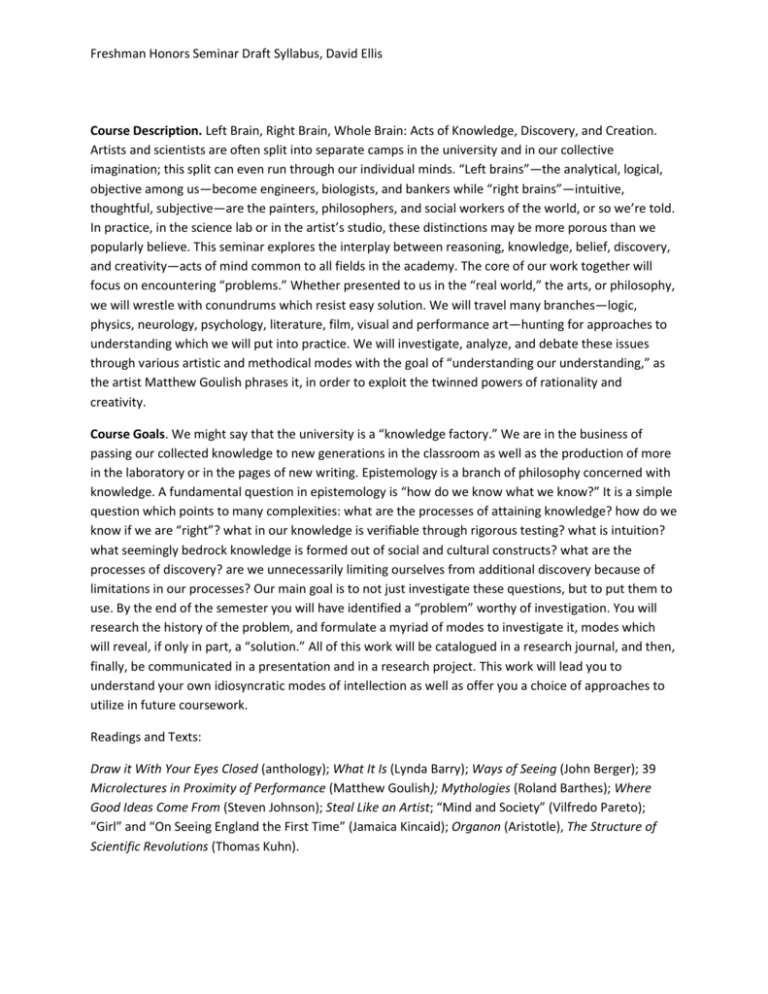
Freshman Honors Seminar Draft Syllabus, David Ellis Course Description. Left Brain, Right Brain, Whole Brain: Acts of Knowledge, Discovery, and Creation. Artists and scientists are often split into separate camps in the university and in our collective imagination; this split can even run through our individual minds. “Left brains”—the analytical, logical, objective among us—become engineers, biologists, and bankers while “right brains”—intuitive, thoughtful, subjective—are the painters, philosophers, and social workers of the world, or so we’re told. In practice, in the science lab or in the artist’s studio, these distinctions may be more porous than we popularly believe. This seminar explores the interplay between reasoning, knowledge, belief, discovery, and creativity—acts of mind common to all fields in the academy. The core of our work together will focus on encountering “problems.” Whether presented to us in the “real world,” the arts, or philosophy, we will wrestle with conundrums which resist easy solution. We will travel many branches—logic, physics, neurology, psychology, literature, film, visual and performance art—hunting for approaches to understanding which we will put into practice. We will investigate, analyze, and debate these issues through various artistic and methodical modes with the goal of “understanding our understanding,” as the artist Matthew Goulish phrases it, in order to exploit the twinned powers of rationality and creativity. Course Goals. We might say that the university is a “knowledge factory.” We are in the business of passing our collected knowledge to new generations in the classroom as well as the production of more in the laboratory or in the pages of new writing. Epistemology is a branch of philosophy concerned with knowledge. A fundamental question in epistemology is “how do we know what we know?” It is a simple question which points to many complexities: what are the processes of attaining knowledge? how do we know if we are “right”? what in our knowledge is verifiable through rigorous testing? what is intuition? what seemingly bedrock knowledge is formed out of social and cultural constructs? what are the processes of discovery? are we unnecessarily limiting ourselves from additional discovery because of limitations in our processes? Our main goal is to not just investigate these questions, but to put them to use. By the end of the semester you will have identified a “problem” worthy of investigation. You will research the history of the problem, and formulate a myriad of modes to investigate it, modes which will reveal, if only in part, a “solution.” All of this work will be catalogued in a research journal, and then, finally, be communicated in a presentation and in a research project. This work will lead you to understand your own idiosyncratic modes of intellection as well as offer you a choice of approaches to utilize in future coursework. Readings and Texts: Draw it With Your Eyes Closed (anthology); What It Is (Lynda Barry); Ways of Seeing (John Berger); 39 Microlectures in Proximity of Performance (Matthew Goulish); Mythologies (Roland Barthes); Where Good Ideas Come From (Steven Johnson); Steal Like an Artist; “Mind and Society” (Vilfredo Pareto); “Girl” and “On Seeing England the First Time” (Jamaica Kincaid); Organon (Aristotle), The Structure of Scientific Revolutions (Thomas Kuhn). Freshman Honors Seminar Draft Syllabus, David Ellis Films: Mindwalk; Exit Through the Giftshop; Un Chien Andalou; Carl Sagan’s Cosmos; What Darwin Never Knew; What the Bleep do We Know? Powaqqatsi Requirements: 1) Portfolio of all class work (30%) Portfolio: Homework assignments, in-class writing and other work, project journal 2) Class Presentation on project (20%) 3) Research project: (Draft 1: 10%; Draft 2: 10%; Draft 3: 20%) 4) Participation (10%) Research Project Options: The bulk of your work during the semester will be related to your research project. Early in the semester you will locate an interesting and compelling “problem,” one which both fascinates and frustrates you. The problem will arise out of your “reading” of the “real world,” the arts, the sciences, professional disciplines, or from a combination of these categories. You will then approach this problem in a series of exercises, ranging from strict empiricism to playful subjectivism. You will then choose one of the below methods as way to further explore and then present on the problem. Humanities Research Paper: 12-15 pages Philosophical Treatise with Research Component: 12-15 pages Creative Project with Written Component: the “piece” plus 3-5 pages Design and Write Experimental Research Proposal: 12-15 pages Design and Write Field Study Proposal: 12-15 pages Policy Proposal with Research Component: 12-15 pages Project of your own design (needs prior approval) Tentative Schedule: Week 1 Section: What is a thought? Lynda Barry, Lewis Thomas, LeGuin, Johnson Is Memory a thought? Freshman Honors Seminar Draft Syllabus, David Ellis Week 2 Subject: What is knowledge, what is wisdom? Week 3 Subject: The Art and Science of Not-knowing: Mysteries and Obfuscations DUE: Portfolio Check DUE: Project “Brainstorm” Week 4 Section: Objectivity and Subjectivity, Self and self-hood, solipsism, moving into empiricism Karl Popper, Thomas Kuhn DUE: Project “Pitch” Week 5 Section: What is Creativity? Matthew Goulish, John Cage, John Anderson, Steven Johnson Week 6 Section: Acts of Discovery Bronowski, Bird of Paradise Crowdsourcing: wisdom of crowds, James Soruwieki. DUE: Portfolio Check DUE: Sources “Brainstorm” Week 7 Modes of Cultural Communication of Knowledge: Social Conditioning, Social Constructs, Education, Confirmation Bias “Toys” Barthes, Pavlov, Cooper “Labyrinthine,” “Burl’s” Labels in the LGBT world and in the Straight World. Friere “Banking concept,” Radio Lab stuff. Bartholomew’s Song, Stanford Prison Experiment, Milgram Experiment Freshman Honors Seminar Draft Syllabus, David Ellis Week 8 Section: Epistemology Meets Cognition DUE: Annotated Bibliography Week 9 Sections: Communication of Research DUE: Portfolio Check Week 10 Section: Patterns and Repetitions Powaqqatsi, Ionesco (Exit the King), Watt Samuel Beckett Start of Presentations Week 11 DUE: Draft 1 of Project Week 12 DUE: Portfolio Check Week 13 DUE: Draft 2 of Project Week 14 Week 15 DUE: Final Project; Complete Portfolio



